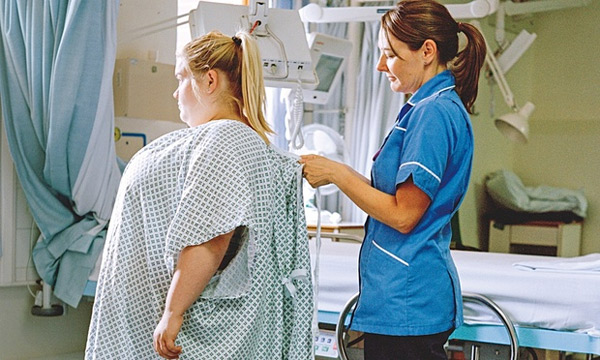
The largest, longest study of teen obesity surgery shows huge weight loss and health gains can last at least three years, and many say it’s worth the risks.
The study shows teen surgery can reverse obesity-related complications that can have life-shortening consequences, “and that ultimately is more important than actual pounds lost,” said Dr. David Ludwig, an obesity expert at Boston Children’s Hospital who had no role in the research.
The results were published in the New England Journal of Medicine and presented at the Obesity Society annual meeting in Los Angeles.
The study included teens aged 13 to 19 treated at five centers. Most had gastric bypass surgery — a stomach-stapling procedure that reduces the stomach to a small pouch. Almost a third had a less drastic stomach-reducing operation called sleeve gastrectomy.
Among the before and after results:
- 75 percent had unhealthy blood fat levels including high triglycerides and too little good cholesterol: in two-thirds of them it vanished.
- 40 percent had elevated blood pressure; it returned to normal in three-quarters.
- Almost 20 percent had abnormal kidney function; it disappeared in more than 80 percent.
- 13 percent had Type 2 diabetes; it disappeared in more than 90 percent.
Lead author Dr. Thomas Inge, who directs an obesity surgery program at Cincinnati Children’s Hospital Medical Center, said seeing diabetes and other obesity-related health problems resolved was remarkable and gratifying. The weight loss also was encouraging, Inge said, but he added that it’s unlikely patients will lose additional weight.
“Nineteen out of 20 patients that had diabetes were able to reverse that diabetes,” Inge said.
Points that need to be Considered Before Opting for Surgery
- The minimum age should be 15 for boys and 13 for girls, who develop faster. The teens also should have nearly reached sexual maturity and their adult height.
- Dr. Richard Thirlby, a bariatric surgeon at Virginia Mason Medical Center who has operated on a handful of older teens, considers emotional maturity, not just physical. He doubts patients under 16 can comprehend they are committing to “never eating like a normal person for the rest of their lives.”

- After surgery, many have to take supplements or receive shots for the rest of their lives. Adolescents are notorious for ignoring doctor’s instructions, a dangerous prospect when lifelong vitamins and possibly shots may be needed to prevent serious complications.
- The patient should have a body mass index (BMI) of 40 or higher (for example, someone 5’4″ would have to weigh at least 233 pounds to qualify), or a BMI of 35 (a weight of 204 for someone 5’4″) or greater with serious obesity-related health problems, such as type 2 diabetes.
- Both patient and parent/guardian must provide consent.
- The patient should make lifestyle changes– becoming more active and eating healthier — before undergoing the surgery.
- The teenager and the family should be well informed of what they are getting into. (The surgery may also require financial support: Many families pay out-of-pocket for the procedure, which usually costs between $10,000 and $20,000, although insurance companies do sometimes agree to cover it.)
For detailed input, visit http://www.bariatric-surgery-
Risks After Surgery
Despite the safety of teen weight loss surgery when compared with adults, there are still risks that should be seriously considered and understood by prospective patients. The side-effects of gastric surgery can include long‑term health problems such as bone-thinning, fractures, anaemia and kidney stones due to malnutrition, quite apart from psychological problems, including suicide.
Remember, Surgery is just a tool, not a magic bullet.
For more input
Disclaimer
The Content is not intended to be a substitute for professional medical advice, diagnosis, or treatment. Always seek the advice of your physician or other qualified health provider with any questions you may have regarding a medical condition.



